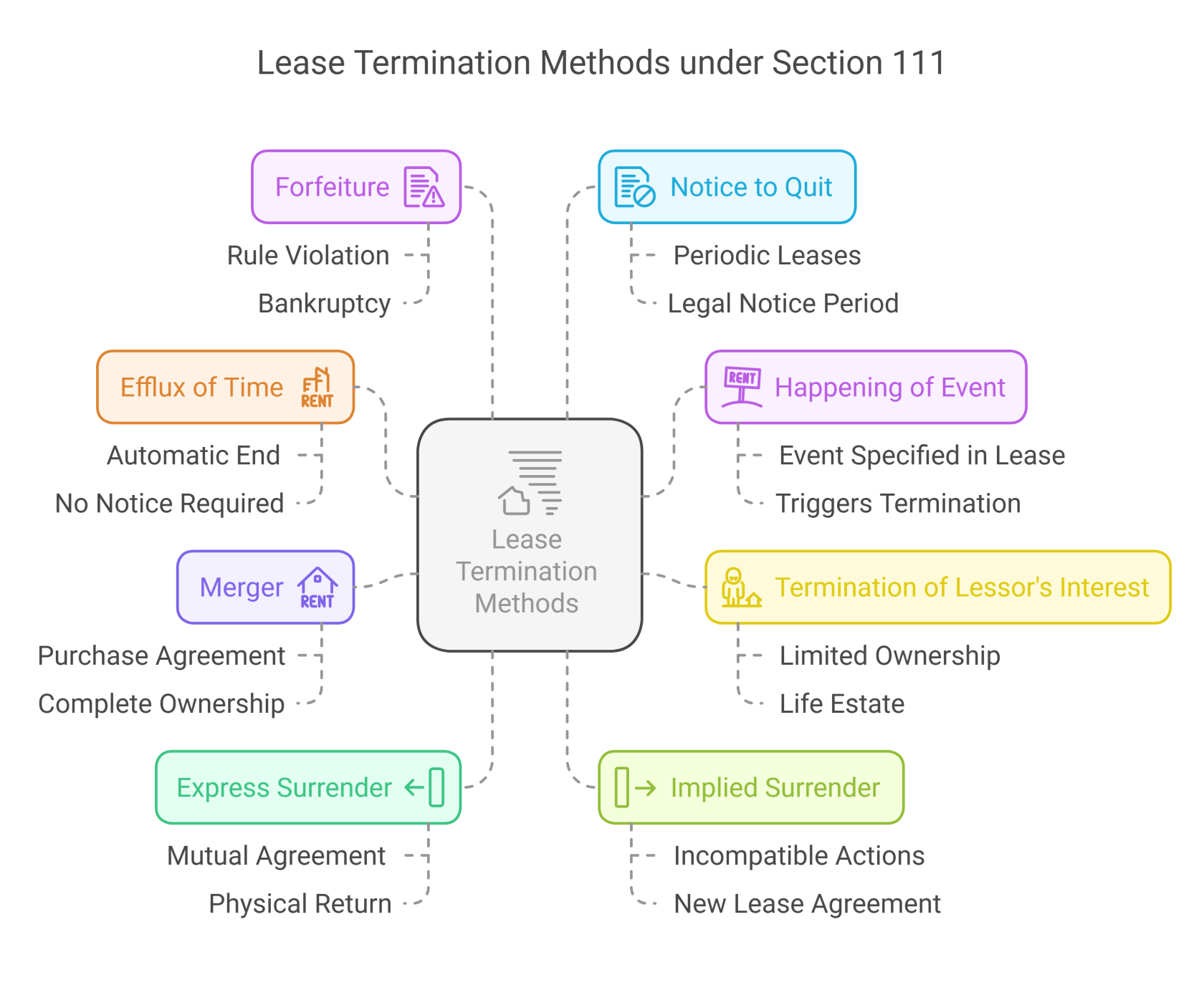Lease rental determination
How a Lease Ends: A Explanation of Section 111 of the Transfer of Property Act
Section 111 of the Transfer of Property Act outlines the different ways a lease agreement can be terminated, meaning the lessee (renter) must give the property back to the lessor (landlord). Think of these as the various ways your "rental agreement" can come to an end.
1. By Time's Up (Efflux of Time - Section 111(a))
- What it means: The lease agreement has a specific end date. When that date arrives, the lease automatically ends.
- Example: You sign a one-year lease. After one year, the lease is over.
-
Important:
- No need for a separate "notice to quit" from the landlord. The end date in the lease is enough.
- If the renter dies, their heirs inherit the lease until the end date.
- An unregistered lease (not officially recorded) cannot be terminated this way. The lease agreement must be valid.
2. By Event Happening (Happening of Some Event - Section 111(b))
- What it means: The lease ends when a specific event mentioned in the lease agreement happens.
- Example: A lease is granted for the duration a particular business is running on the property. When the business closes, the lease ends. Or, a lease on land is granted until a specific building is constructed. Once built, the lease ends.
- Important: The event MUST be specified in the lease agreement as a trigger for termination.
3. Landlord's Interest Ends (Termination of Lessor's Interest - Section 111(c))
- What it means: The landlord's right to own or lease the property ends.
- Example: A landlord has a limited ownership (like a "life estate" - they only own the property for their lifetime). They lease the property to you. When they die, their ownership ends, and so does your lease.
- Important: The lease is only as good as the landlord's ownership rights.
4. Merger (Section 111(d))
- What it means: The renter becomes the owner of the property.
- Example: You're renting a house, and then you buy the house from the landlord. Your lease is now gone because you own the property. The lease is absorbed into the ownership.
- Important: For this to work, the renter must buy the entire property.
5. Express Surrender (Section 111(e))
- What it means: The renter voluntarily gives up the lease to the landlord before the end date.
- Example: You decide to move out early, and the landlord agrees to let you end the lease early. You both agree, and you return possession of the property.
-
Important:
- Both the renter and landlord must agree.
- The renter must physically give the property back to the landlord (or show a clear intention to do so).
- No written agreement is required, but it's a good idea to have one.
6. Implied Surrender (Section 111(f))
- What it means: The lease ends because the actions of the landlord and renter show they both intended to end the lease, even if they didn't say it directly.
- Example: The renter moves out, and the landlord starts renting the property to someone else. The landlord's action of re-renting is inconsistent with the old lease, so the old lease is considered surrendered. Or, the landlord and renter enter into a new lease agreement for the same property. The new lease cancels the old lease.
- Important: The new situation or actions must be clearly incompatible with the old lease.
7. Forfeiture (Section 111(g))
- What it means: The lease ends because the renter did something that violates the lease agreement, giving the landlord the right to kick them out.
-
Reasons:
- The renter breaks a specific rule in the lease (and the lease says breaking the rule allows the landlord to end the lease).
- The renter denies the landlord's ownership (claims they own the property or that someone else owns the property).
- The renter goes bankrupt (and the lease says bankruptcy allows the landlord to end the lease).
- Important: The landlord must give the renter written notice that they are ending the lease.
8. Notice to Quit (Section 111(h))
- What it means: Either the landlord or renter gives the other person a formal written notice that they want to end the lease.
- Applies to: Periodic leases (month-to-month or year-to-year). It does not apply to leases with a fixed end date.
-
Important:
- The notice must be given a certain amount of time before the lease ends (as required by law - see Section 106 mentioned in the text).
- If the renter stays even after the notice period ends, they don't automatically become the owner of the property. The landlord can still sue to evict them.
In summary, Section 111 provides a comprehensive framework for understanding how lease agreements can be legally terminated, ensuring clarity and fairness for both lessors and lessees.


No Comments